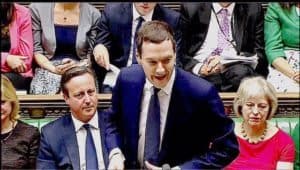 IW Capital, a financial firm that has facilitated over £60 million worth of investment into the UK’s SME sector, has published a report on the UK tax landscape. The report, embedded below, states that with the forthcoming Budget report (March 16), scrutiny of the tax environment is growing. While the current UK government has been quick to laud its tax landscape in contrast to other countries, this document points out that a tax increase may be around the corner;
IW Capital, a financial firm that has facilitated over £60 million worth of investment into the UK’s SME sector, has published a report on the UK tax landscape. The report, embedded below, states that with the forthcoming Budget report (March 16), scrutiny of the tax environment is growing. While the current UK government has been quick to laud its tax landscape in contrast to other countries, this document points out that a tax increase may be around the corner;
“In February 2016, the Institute for Fiscal Studies (IFS) stated that George Osborne’s “inflexible” Budget targets may mean the Government is forced to introduce sudden tax rises in order to achieve a forecasted surplus of 0.5% of national income by 2020. With the next Budget due to be delivered on 16 March, the IFS warned that the Chancellor’s desire to ful l this commitment in the present economic climate could result in “big tax rises … with very little notice”.”
 As it stands today, the IW Capital report provides some interesting data points;
As it stands today, the IW Capital report provides some interesting data points;
- The average income tax bill in the UK is £5,590
- The average income tax bill for the 788,000 people in the UK who earn over £100,000 – the top 2.7% of the British taxpayer population – is £81,700
- These high earners paid 39% of the UK’s total income tax bill in 2014/15. In the 2012/2013 period the percentage was 35%
- Investors with over £40,000 worth of investments pay an average £26,058 in income tax – more than four times the national average
- Regarding utilization of EIS (Enterprise Investment Scheme) over four-fifths (84%) of investors in London would consider the plan
 Since IW Capital supports SME investment, a profoundly important sector of the UK economy, they believe the EIS tax exemption is incredibly important. Quoting Sarah Wadham, Director General of the EIS Association;
Since IW Capital supports SME investment, a profoundly important sector of the UK economy, they believe the EIS tax exemption is incredibly important. Quoting Sarah Wadham, Director General of the EIS Association;
“There are very few legitimate ways you can guard tax, but investors should be aware that EIS is a legitimate, government-sponsored form of tax planning. Schemes such as EIS are extremely important and contribute a huge amount to the economy – they need to be protected and looked after.”
The EIS exemption aids smaller companies as it incentivizes investment into SMEs. According to data provided in the report,
“There are very few legitimate ways you can guard tax, but investors should be aware that EIS is a legitimate, government-sponsored form of tax planning. Schemes such as EIS are extremely important and contribute a huge amount to the economy – they need to be protected and looked after.”
So why would the government want to curtail a popular program that benefits both investor and entrepreneur (along with the UK economy)? There is a push in Brussels to limit state aid to smaller companies. In a recent interview, Wadham said the approach in Brussels may send early stage companies “off a cliff”.
 CEO of IW Capital, Luke Davis maintains hope that the forthcoming Budget speech will lessen these economic fears;
CEO of IW Capital, Luke Davis maintains hope that the forthcoming Budget speech will lessen these economic fears;
“I hope the 2016 Budget addresses British taxpayer sentiment uncovered in this report by improving public access to EIS. This will ensure that high-net-worth investors are able to offset some of their tax bill by investing in Britain’s entrepreneurial future, thereby supporting high-growth SMEs in need of capital and boosting the long-term economic prosperity of the UK.”
[scribd id=303421417 key=key-lPg6BBRNfmUtycp4SIze mode=scroll]

